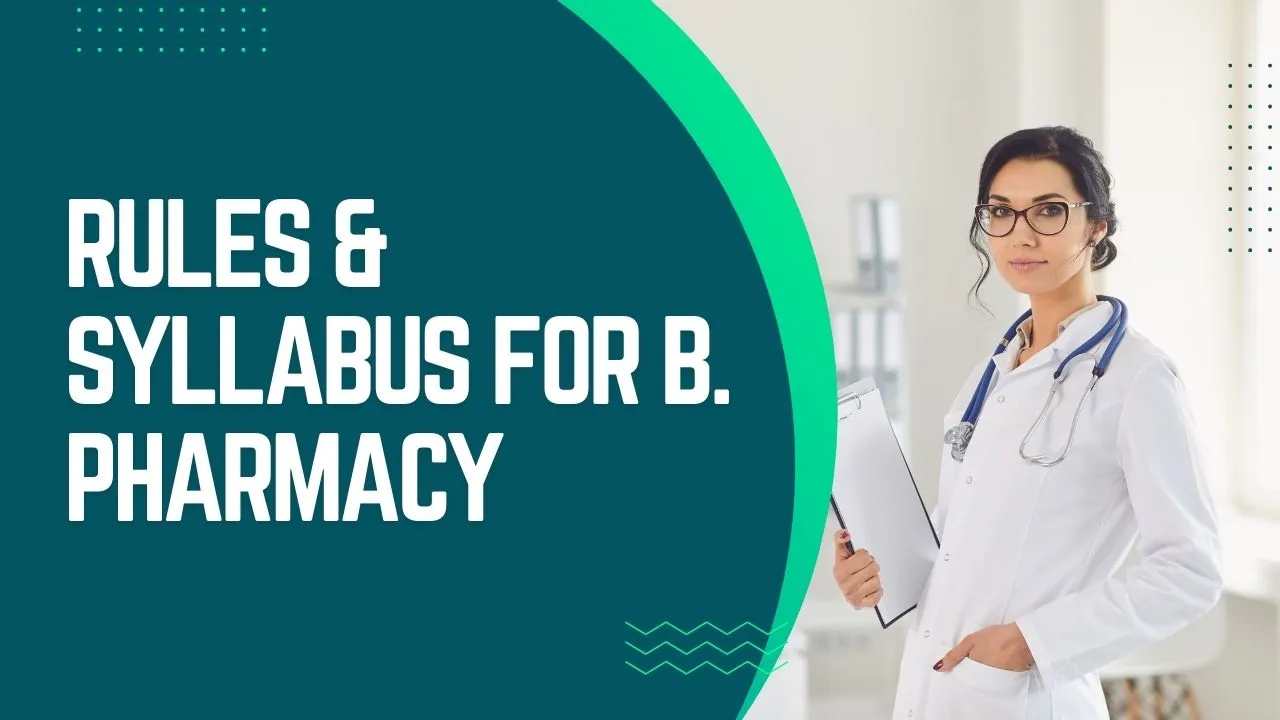Introduction
The Bachelor of Pharmacy (B. Pharm) is a professional degree course in the field of pharmaceutical sciences. This program equips students with knowledge of drug formulation, production, and regulation. In this article, we will discuss the rules, regulations, and syllabus of the B. Pharm course to help students understand the program structure and expectations.
The Bachelor of Pharmacy (B. Pharm) course is designed to provide students with comprehensive knowledge of the pharmaceutical industry. The structured curriculum ensures a strong foundation in both theoretical and practical aspects, preparing graduates for various roles in the healthcare sector. Choosing the right college and staying updated with regulatory guidelines is essential for a successful career in pharmacy.
Table of Contents
Rules & Regulations for B. Pharm Course
1. Eligibility Criteria
- Candidates must have completed 10+2 (Science stream) with Physics, Chemistry, and Biology/Mathematics.
- Minimum aggregate marks required may vary based on university norms (usually 50%-60%).
- Some institutions require candidates to qualify for entrance exams like GPAT, state-level CETs, or university-specific tests.
2. Course Duration
- The B. Pharm course is a 4-year undergraduate program, divided into 8 semesters.
- A lateral entry option is available for Diploma in Pharmacy (D. Pharm) holders to join directly in the second year (third semester).
3. Attendance Requirements
- A minimum 75% attendance is mandatory in theory and practical classes.
- Shortage of attendance may lead to disqualification from exams.
4. Examination & Evaluation
- Internal Assessments: Periodic tests, assignments, and practical evaluations.
- Semester-End Exams: Theory and practical examinations are conducted.
- Minimum Passing Marks: Students must secure at least 40%-50% marks in both theory and practical exams.
5. Internship & Training
- Students must complete a minimum of 4-6 months of industrial training or internships in pharmaceutical companies or hospitals.
- Practical exposure is a crucial part of the curriculum to enhance industry readiness.
Syllabus for B. Pharm Course
The B. Pharm curriculum is designed to provide in-depth knowledge of pharmaceutical sciences, including drug formulation, medical chemistry, pharmacology, and clinical research.
Year-wise Breakdown of the Syllabus
First Year
- Pharmaceutical Chemistry-I (Inorganic & Organic Chemistry)
- Human Anatomy & Physiology-I
- Biochemistry
- Pharmaceutics-I (Basic Formulations & Dispensing Pharmacy)
- Communication Skills
- Environmental Science
Second Year
- Pharmacognosy & Phytochemistry-I
- Pharmaceutical Microbiology
- Pharmacology-I (Basic Pharmacodynamics & Pharmacokinetics)
- Physical Pharmaceutics-I
- Medicinal Chemistry-I
- Pharmaceutical Engineering
Third Year
- Pharmacology-II (Advanced Pharmacological Studies)
- Medicinal Chemistry-II
- Pharmaceutical Analysis
- Hospital & Clinical Pharmacy
- Cosmetic Science
- Quality Assurance & Regulatory Affairs
Final Year
- Biopharmaceutics & Pharmacokinetics
- Pharmaceutical Jurisprudence (Drug Laws & Ethics)
- Industrial Pharmacy (Manufacturing & Drug Development)
- Novel Drug Delivery Systems
- Project Work & Research Methodology
- Electives (such as Herbal Drug Technology, Clinical Research, etc.)
Career Opportunities after B. Pharm
After completing the B. Pharm course, graduates can explore various career paths:
- Pharmaceutical Industry: Roles in drug manufacturing, quality control, and R&D.
- Clinical Research: Opportunities in clinical trials and drug testing.
- Community & Hospital Pharmacy: Dispensing medications and patient counseling.
- Regulatory Affairs: Working with drug laws and compliance.
- Academics & Higher Studies: Pursuing M. Pharm or MBA in Pharmaceutical Management.
Frequently Asked Questions (FAQs)
1. Is NEET required for B. Pharm admission?
No, NEET is not mandatory for B. Pharm admissions. However, some universities conduct their own entrance exams.
2. Can I pursue B. Pharm after completing a diploma in pharmacy (D. Pharm)?
Yes, D. Pharm holders can apply for lateral entry admission into the second year of the B. Pharm course.
3. What is the difference between B. Pharm and Pharm D?
B. Pharm focuses on pharmaceutical sciences and industry, while Pharm D is a doctoral program specializing in clinical pharmacy and patient care.
4. What are the job opportunities after B. Pharm?
Graduates can work in pharmaceutical industries, clinical research, hospital pharmacies, and regulatory agencies.
5. Can I open my own pharmacy after B. Pharm?
Yes, after obtaining a license from the Pharmacy Council of India (PCI), you can open your own pharmacy.
